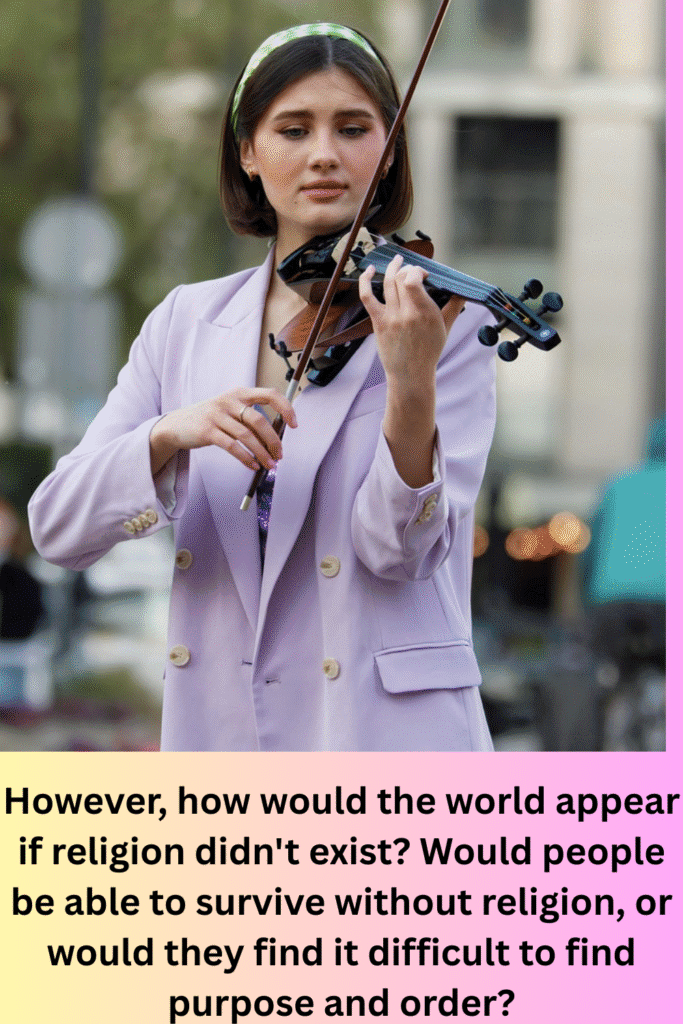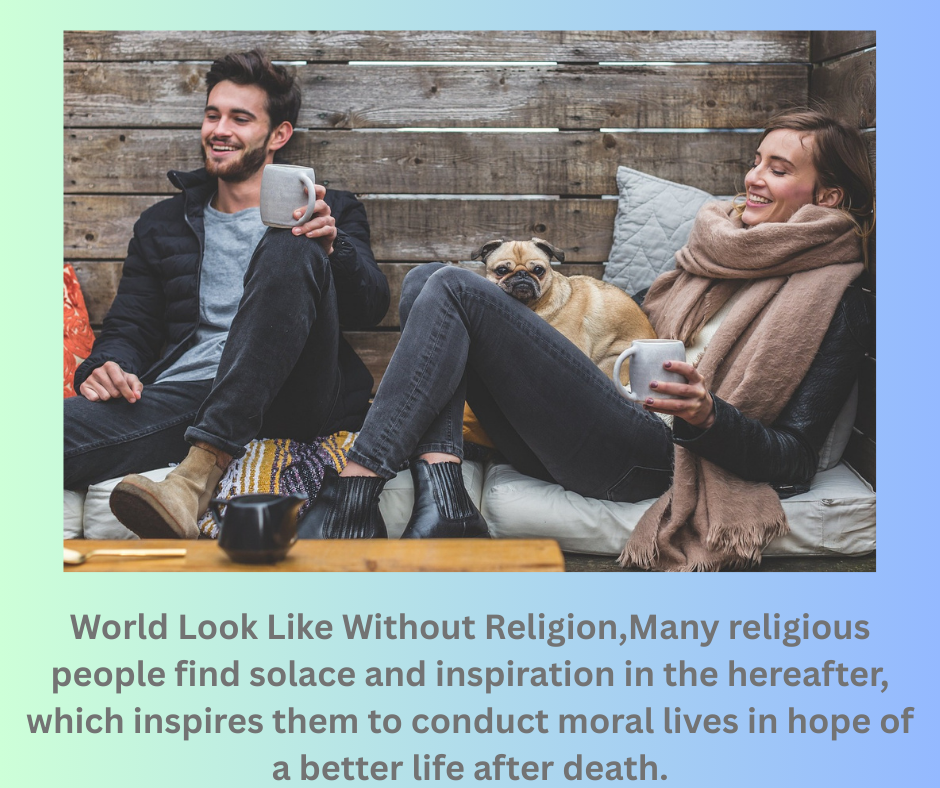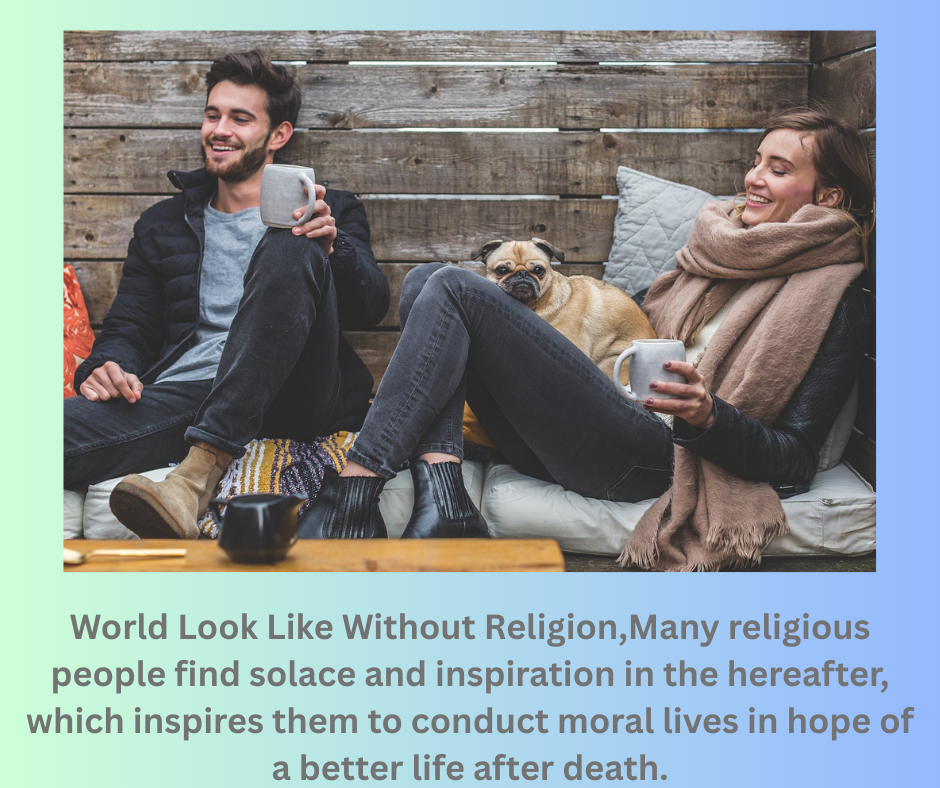World Look Like Without Religion,For thousands of years, religion has been an essential component of human society. It has influenced people’s interactions with one another, sense of purpose, and worldview, shaping cultures, societies, legal systems, and individual lives. Religion has been a significant source of moral instruction, social order, and communal cohesion from ancient civilizations to contemporary ones.
However, how would the world appear if religion didn’t exist? Would people be able to survive without religion, or would they find it difficult to find purpose and order?

Even while the concept of a world devoid of religion can appear hypothetical and abstract, it is a thinking exercise that can teach us a lot about the character of people, the place of religion in society, and the possible repercussions of a secular society. Let’s examine the potential ramifications of a world devoid of religion, taking into account issues like moral standards, social cohesiveness, identity, conflict, and the pursuit of meaning.
Table of Contents
A Shift in Moral Frameworks
For many years, religion has served as a source of moral instruction, giving followers rules on how to live moral lives, what is right and wrong, and how to treat others. The issue of moral underpinnings takes center stage when religion is absent. Where would people get their sense of morality if there were no heavenly lawgiver?
,World Look Like Without Religion,Moral systems would probably move toward secular ideologies in a world devoid of religion. Numerous ethical systems, including utilitarianism, deontology, and virtue ethics, emphasize the welfare of people and the results of their deeds without calling for faith in a higher force.
In the absence of religious teaching, humanism, for instance, emphasizes the significance of human reason, ethics, and justice. According to this new paradigm, morality would probably be determined less by religious precepts and more by empathy, reason, and the collective human experience.
However, there may be issues with universal moral consensus in a world without religion. Within societies, religious systems offer a shared ground for moral behavior. People could find it difficult to create generally recognized moral standards in the absence of religion. Diverse, conflicting ethical frameworks could exacerbate division and conflict in such a situation.
The absence of a unified religious authority may result in moral relativism, where individuals’s views on good and wrong diverge greatly, even yet many people may still adhere to moral standards based on universal human values.
Social Cohesion and Community
Building a sense of belonging and community is one of religion’s most significant functions. Religious organizations have always been places where people congregate, exchange stories, and build close social ties.
Along with chances for group worship, almsgiving, and cultural customs, they offer a feeling of identification, continuity, and unity. World Look Like Without Religion,Without religion, people could look for other ways to connect with one another. Building social cohesion could be a greater function of secular organizations like political movements, social clubs, and community centers.
Common interests, pastimes, or causes—like human rights or environmental activism—may help people bond. It is possible that the social fabric may become more inclusive, emphasizing shared human values and interests over religious allegiance.

But the loss of traditional communal institutions, on which many people have depended for ages, could also result from the absence of religion. People can get together, celebrate, and build relationships with others in their community through religious holidays, rituals, and gatherings. Some people may feel alone or purposeless without these customs, particularly if their social networks were strongly influenced by their religious identities.
Identity and Purpose
Religion frequently gives people a feeling of purpose and identity. Faith and the conviction that their lives are a part of a larger, divine purpose are what give believers strength. People would have to look for other forms of meaning and purpose if religion were to disappear. Secular ideologies like existentialism, which holds that people are in charge of determining their own meaning in life, may be the first choice for others.
Others may find meaning in their careers, families, personal accomplishments, or making a positive impact on society.
The idea of the hereafter, whether it be heaven, reincarnation, or some other type of spiritual existence, would likewise not exist in a world devoid of religion. World Look Like Without Religion,Many religious people find solace and inspiration in the hereafter, which inspires them to conduct moral lives in hope of a better life after death.
Without this conviction, the purpose of existence may shift toward the here and now, emphasizing individual fulfillment, human flourishing, and societal well-being.
Additionally, the quest for identity may take on new forms. Individuals may discover significance in their familial history, cultural legacy, or a more general humanist perspective. With a stronger focus on comprehending the cosmos, nature, and human potential, the religious inquiry of “Why are we here?” may give way to a more philosophical or scientific investigation of human life.
Conflict and Violence
The part religion plays in war and violence is among its most controversial features. Religious disagreements have historically been a major factor in terrorism, persecution, and bloodshed. Religious intolerance and ideological divide have been significant factors in the Crusades, the Thirty Years’ War, the Inquisition, and many other conflicts. Would there be less violence in the world if there were no religion?
It’s not a simple answer. World Look Like Without Religion,Religion has contributed significantly to the advancement of peace, reconciliation, and diplomacy, despite the fact that it has also been a cause of violence. Religious figures who have utilized their faith as a potent instrument to promote social justice and nonviolence include Desmond Tutu, Martin Luther King Jr., and Mahatma Gandhi. Furthermore, during times of violence, religious organizations have long mediated peace accords and promoted societal harmony.
Even if there were no religion, humans would probably still find reasons to fight. Regardless of one’s religious beliefs, violence can arise due to human nature as well as political, economic, and societal circumstances.
Much of human history has been fueled by ideological disagreements, territorial conflicts, and resource wars; it is plausible that these forces could continue to do so in a secular society. Although religion may not be a prerequisite for war, the root reasons of human conflict may still exist even if it is absent.
The Decline of Religious Institutions and Charitable Work
Religious institutions have traditionally been in the forefront of humanitarian endeavors, helping those in need by offering them food, shelter, healthcare, and education. In many religious traditions, the principles of compassion, generosity, and aiding the less fortunate are profoundly embedded.
The question of how these altruistic purposes would be carried out in the absence of religion comes up. Secular governments and organizations would probably be more involved in delivering social services in a world devoid of religion.
The gap left by religious charities may be filled by state-sponsored welfare programs, nonprofit groups, and foreign aid organizations. The lack of religion may also result in more egalitarian and secular strategies that emphasize universal human rights and evidence-based policies to combat social injustice, poverty, and inequality.
On the other hand, some fear that the disappearance of religious organizations may result in a reduction in the sense of individual accountability for the well-being of others. World Look Like Without Religion, Religious teachings frequently stress that it is one’s moral obligation to assist those in need; without this obligation, some people may be less likely to participate in charity endeavors. World Look Like Without Religion,Without the driving power of faith, the charity and volunteerism that religious organizations have long encouraged may be lessened.
A Secular Society Focused on Science and Reason
Without religion, there might be more focus on reasoned reasoning and scientific investigation. More people would probably pursue knowledge via reason, proof, and the scientific method in a secular environment. As society values empirical knowledge more than religious dogma, technological, medical, and educational advancements may accelerate. But a world devoid of religion might likewise have trouble striking a balance between ethical issues and scientific advancement.
Religion has frequently offered moral standards for scientific discoveries, particularly in fields like bioethics, cloning, and medical research. Society would have to create new frameworks for handling moral conundrums in science and technology if religion had no impact.
Conclusion
Without religion, the world would surely be considerably different from what it is today. The reality is more complicated, even while some people would see the lack of religion as a chance for a more logical, harmonious, and cohesive world. Human history has been significantly shaped by religion, which has also inspired altruism, created moral frameworks, and fostered community. On the other hand, it has caused strife and division.
People would probably look to other sources for morality, community, and meaning in a secular world, but the problems that humanity encounters would still exist even if there were no religion.
Greater dependence on reason, science, and group effort may characterize a world devoid of religion, but it may also give rise to new existential, ethical, and social conundrums. World Look Like Without Religion,The topic of what the world would be like without religion ultimately concerns not just the lack of belief but also how people would manage the intricate relationship between personal values, group objectives, and the pursuit of meaning.
